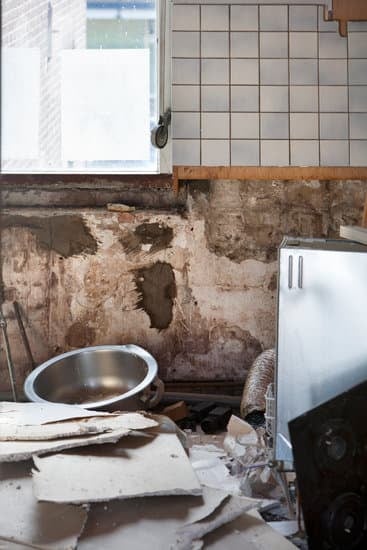Are you wondering, “Do I need to tell insurance about home improvement?” The answer is yes, and it is crucial to keep your insurance company informed about any upgrades or renovations you make to your home. Failing to do so could have significant consequences in the event of a claim.
Home improvements can come in various forms, such as adding an extension, remodeling the kitchen, or upgrading your heating system. These changes can impact the value and safety of your property, which is why it is essential to update your insurance provider accordingly. By keeping them informed, you ensure that your coverage remains appropriate for your updated home.
Not informing your insurance company about home improvements can lead to risks such as being underinsured or having claims denied due to inadequate coverage. It’s important to understand how these renovations can affect your insurance policy and take the necessary steps to update it accordingly. Failure to do so could result in unexpected expenses and financial burdens down the line.
What Constitutes a Home Improvement
When considering whether or not to inform your insurance company about home improvements, it’s essential to understand what constitutes a home improvement in the eyes of insurers. A home improvement typically refers to any renovation, upgrade, or alteration made to your property that increases its value.
This can include major projects such as adding an extension, remodeling a kitchen or bathroom, installing a new roof, upgrading electrical or plumbing systems, or even making cosmetic changes like painting the interior or exterior of your home.
It is crucial to report significant home improvements to your insurance provider for several reasons. Firstly, failing to disclose these changes could result in your property being underinsured in the event of a claim.
If you’ve invested time and money into improving your home without updating your policy limits, you may not receive adequate compensation for damages in the event of a covered loss. Additionally, some renovations, such as adding a swimming pool or finishing a basement, could increase the risk of accidents on your property, potentially leading to liability claims against you.
In order to ensure that you are adequately protected in the event of a claim and that your insurance coverage accurately reflects the value of your property post-renovation, it’s crucial to notify your insurance company about any significant home improvements. By providing detailed information about the upgrades you’ve made to your home, you can work with your insurer to update your policy accordingly and avoid potential pitfalls down the road.
| Home Improvement | Impact on Insurance |
|---|---|
| Adding an extension | May increase dwelling coverage limits |
| Installing new roof | Could lead to discounts on premiums |
| Remodeling kitchen or bathroom | Might affect replacement cost coverage |
Why It’s Essential to Update Your Insurance Provider
When it comes to home improvements, one crucial aspect that homeowners often overlook is updating their insurance provider about these changes. Many individuals might wonder, “Do I need to tell insurance about home improvement?” The answer is a resounding yes. Failing to inform your insurance company about renovations or upgrades to your home can have serious repercussions in the event of a claim.
Imagine this scenario: you’ve invested significant time and money into remodeling your kitchen with top-of-the-line appliances and fixtures. However, if you experience a fire or water damage that affects your newly renovated kitchen, but you hadn’t informed your insurance company about these upgrades, you could potentially face challenges when filing a claim. Without the proper updates to your policy, you may not receive full coverage for the improvements you’ve made.
Not keeping your insurance provider in the loop about home improvements can lead to being underinsured or facing denied claims. By failing to update your policy, you run the risk of losing out on receiving adequate compensation for damages or losses related to the upgraded areas of your home. It’s essential to understand that informing your insurer about these changes is not only responsible but also an important step in protecting your investment in your property.
| Impact of Not Informing Insurance About Home Improvements | Risks |
|---|---|
| Being underinsured for renovations or upgrades | Lack of coverage for improved areas in case of damage |
| Potential denial of claims related to unreported improvements | Incurring unexpected out-of-pocket expenses |
How Home Improvements Can Affect Your Insurance Coverage
When it comes to home improvements, many homeowners may wonder, “Do I need to tell insurance about home improvement?” The answer is a resounding yes. Informing your insurance company about any renovations or upgrades to your home is crucial in ensuring that you have the proper coverage in place. Failure to do so could potentially leave you vulnerable in the event of a claim.
Here are some ways in which home improvements can affect your insurance coverage:
- Increased Replacement Cost: Renovations can increase the value of your home, which means that the cost to rebuild or repair it in case of damage may also go up. Not updating your policy to reflect these changes could result in being underinsured.
- Changes in Risk: Certain renovations, such as adding a swimming pool or installing a wood-burning stove, can increase the risk of accidents or damage on your property. Your insurer needs to be aware of these changes to properly assess and manage these risks.
- Impact on Liability: Home improvements that involve creating additional living space, such as finishing a basement or adding an extension, can impact your liability coverage. If someone were to get injured on your property, having the right coverage limits is essential.
In order to avoid any gaps in coverage or potential claims issues down the line, it is important to update your insurance provider whenever you make significant changes to your home. By doing so, you can ensure that you have the appropriate level of protection in place and peace of mind knowing that you are adequately covered.
Steps to Take When Informing Your Insurance Company
Evaluation of Home Improvements
Before contacting your insurance company to inform them about your home improvements, it is crucial to evaluate the changes you have made. Consider whether the modifications have increased the value of your property, improved safety features, or changed the structure of your home. Any significant alterations should be reported to your insurer, as they can impact your coverage and premiums.
Contacting Your Insurance Provider
Once you have assessed the home improvements and determined that they need to be reported, the next step is to contact your insurance provider. Reach out to them either by phone or email and provide detailed information about the renovations or upgrades you have completed. Make sure to include specifics such as when the work was done, the scope of the project, and any relevant documents or receipts.
Reviewing Your Policy
After notifying your insurance company about the home improvements, it is important to review your policy with them. Discuss how these changes may affect your coverage limits, deductibles, and overall policy terms. Your insurer may recommend adjustments to ensure you are adequately protected after making significant upgrades to your home. Keeping an open line of communication with your provider will help prevent any surprises in case of a claim in the future.
By following these steps and keeping your insurance company informed about home improvements, you can ensure that you have the appropriate coverage for your upgraded property. Remember that transparency is key when it comes to maintaining a good relationship with your insurer and protecting yourself financially in case of unforeseen events.
Common Misconceptions About Home Improvements and Insurance
Many homeowners often wonder, “Do I need to tell insurance about home improvement?” The short answer is yes. Informing your insurance company about any upgrades or renovations to your home is crucial to ensure you have adequate coverage in case of an unforeseen event. Contrary to popular belief, failing to update your insurer about home improvements can lead to coverage gaps and potential claim denials.
To address common misconceptions about home improvements and insurance, let’s debunk some myths and clarify the truth:
- Myth: Home improvements automatically increase my insurance premiums.
- Truth: While certain renovations may result in a premium increase, such as adding a swimming pool or upgrading electrical systems, not all upgrades will raise your rates. In fact, some improvements like installing a security system or replacing old plumbing may even qualify you for discounts.
- Myth: I don’t need to inform my insurance company if the renovation is minor.
- Truth: Regardless of the scale of the renovation, it’s essential to notify your insurer. Even small changes can impact your coverage limits or property value, affecting the amount of coverage you need.
By understanding these myths and truths about home improvements and insurance, homeowners can make informed decisions when updating their insurers about any changes to their property. It’s always better to be transparent with your insurance provider to avoid any surprises during a claim process.
Case Studies
Example 1: The Unreported Renovation
One common case involves homeowners who decide to add an extension to their property without informing their insurance company. In one instance, a family expanded their living room by knocking down a wall to create a more spacious area. However, they failed to update their insurer about this home improvement.
Unfortunately, a few months later, a burst pipe caused significant water damage to the newly renovated space. When they filed a claim with their insurance provider, they were denied coverage because the expansion was not included in their policy. As a result, they had to pay out of pocket for the repairs and restoration work.
Example 2: Upgraded Electrical System
Another scenario involves upgrading the electrical system in a home without notifying the insurance company. A homeowner decided to replace outdated wiring and install new outlets throughout the house for safety reasons. However, they did not realize that these modifications could impact their insurance coverage.
Shortly after completing the upgrades, there was an electrical fire due to faulty wiring connections. When the homeowner contacted their insurer to file a claim for damages, they were shocked to learn that the new electrical work was not covered under their existing policy. They ended up facing hefty expenses for repairs and lost personal belongings.
Example 3: Unreported Pool Installation
In another instance, a family installed an above-ground pool in their backyard as part of a summer renovation project. Excited about having a new recreational feature on their property, they neglected to inform their insurance provider about this addition. Unfortunately, there was an accident where someone slipped and fell while using the pool, resulting in injuries that required medical attention.
When the family sought coverage from their insurance company for liability claims and medical expenses, they were denied due to the pool being considered an unreported change in risk factor on their property. This led them into financial strain as they had to bear all costs related to the incident.
These real-life examples highlight the importance of updating your insurance company about any home improvements or renovations you make. Failure to do so can lead to costly consequences when unexpected events occur at your property. It is crucial to review your policy regularly and communicate changes promptly with your insurer to ensure adequate coverage in times of need.
Tips for Saving Money on Insurance After Home Improvements
When it comes to making improvements to your home, it is essential to keep your insurance company in the loop about any changes. Notifying your insurance provider about home upgrades or renovations can help ensure that your policy accurately reflects the value of your property and the extent of coverage you need.
Failure to inform your insurer about these changes can lead to potential complications if you ever need to file a claim. The question of “do I need to tell insurance about home improvement” should always be answered with a resounding “yes”.
One key reason for informing your insurance company about home improvements is that certain upgrades can affect the replacement cost of your property. For example, adding a new room or installing high-end finishes can increase the value of your home, which may require adjustments to your coverage limits. Without updating this information with your insurer, you may not have adequate coverage in the event of a disaster like fire or severe weather damage.
Additionally, keeping your insurance provider up-to-date on home improvements could potentially save you money on your premiums. Some renovations, such as upgrading plumbing, electrical systems, or installing security features, may qualify you for discounts on your homeowners’ insurance.
By proactively sharing these updates with your insurer, you may be able to take advantage of cost savings while ensuring proper protection for your enhanced property. Remember that transparency and communication are key when it comes to managing your homeowner’s insurance policy effectively.
Frequently Asked Questions
What Should You Not Say to Homeowners Insurance?
It is not advisable to mention any potential fraudulent claims to your homeowners insurance provider. This includes exaggerating the value of damaged property or falsely claiming an item was stolen when it wasn’t.
Will a New HVAC System Lower My Homeowners Insurance?
Installing a new HVAC system may potentially lower your homeowners insurance costs since it can reduce the risk of fire or water damage. However, it’s best to check with your provider to confirm if they offer discounts for such upgrades.
Does Home Insurance Cover DIY?
Home insurance typically does not cover do-it-yourself (DIY) projects that cause damage to your home. If a DIY project goes wrong and results in property damage, it’s unlikely that your insurance policy would cover the costs associated with fixing those damages.

I’m thrilled to have you here as a part of the Remodeling Top community. This is where my journey as an architect and remodeling enthusiast intersects with your passion for transforming houses into dream homes.





